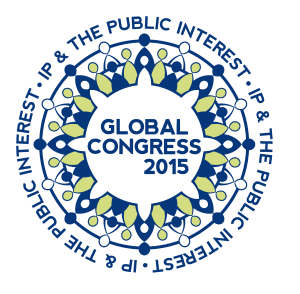Image may be NSFW.
Clik here to view.
This post is part of SpicyIP’s coverage of the Fourth Global Congress on Intellectual Property and the Public Interest.
At the third plenary session of GCIP15, the discussion revolved around challenges in re-articulating ‘public interest’ dimension in IP law and policy. The session saw an eclectic mix of speakers addressing the public interest question from various perspectives- such as copyright, human rights, international law and trade law.
Making Technology Accessible in Indian Languages
The first speaker was Venkatesh Hariharan, Director of Alchemy Business Solutions LLP and a Board Member of Software Freedom Law Center, who discussed open source policy in the Indian context. He spoke about activists’ negotiation with the Government of India to adopt open source as far as possible, to deal with India’s unique demographic of a large population which converses in hundreds of different languages. He ended on the note that while some significant battles have been won in the open source and software patents fronts, there is still a long way to go in making computers and the internet accessible to the 900 million people in India who are not conversant in English.
IP and Public Interest as Yin and Yang
The next speaker was Chunyang Wang, from Peking University. She outlined the development of IP expansion in China, and how it closely followed liberalization and the policy move to attract foreign investment. She then drew upon the conception of Yin and Yang, and compared it to the balance between IP protection and openness.
A BRICs FTA?
Anand Grover, Senior Advocate, then addressed the audience on two developments that affect the public interest in patent law in India- Product Patents and the rise in Free Trade Agreements and Bilateral Investment Treaties. He stressed on how it is important to drive home the point to governments that product patents in pharmaceuticals will lead to exorbitant monopoly pricing, while process patents will lead to relative competition. With respect to Free Trade Agreements, he outlined how having private dispute settlement measures built into FTAs and BITs is a “sinister objective” as it leads to private, opaque, unaccountable arbitration fora deciding matters of public importance such as access to medicines. To counter this development, he proposed a BRICS FTA, which will allow developing countries like India to have more leverage in trade and investment.
TRIPS Flexibilities is the Beginning, not the End Goal
Lisa Forman, a human rights lawyer spoke about the simultaneous proliferation of Human Rights instruments and constitutionalisation of health rights domestically and internationally, and the expansion of TRIPS-plus standards imposed through FTAs, etc. She noted that the former phenomenon means that activists and academics have more tools at their disposal to counter the latter phenomenon. She ended by remarking that narrowly-defined TRIPS flexibilities and exceptions is not the best case scenario, but a losing one. The more we focus on these exceptions, she said, the more we normalize existing norms.
Merging the ‘Independent silos’ of IPR and Human Rights
Justice Ravindra Bhat of the Delhi High Court ended the session with a thorough analysis of access to medicines in International Law. He drew upon the UDHR and the ICESCR and how they are viewed as “independent silos of rights” when compared to IPR. He said that the challenge in the future is to integrate the two sets of rights and read them harmoniously. He also explained provisions from the Vienna Convention on Law of Treaties and cases before the ICJ to emphasise his point.
Follow coverage of GCIP on Spicyip here and follow @spicyip on twitter to get live updates.